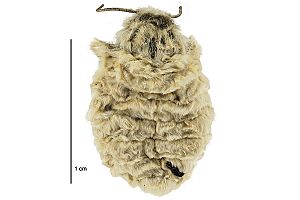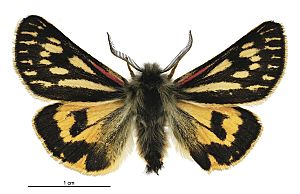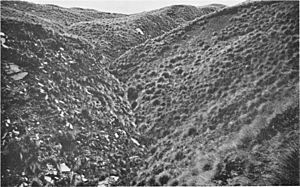Metacrias huttoni facts for kids
Metacrias huttoni is a special kind of moth that lives only in New Zealand. You can find it in the eastern parts of the South Island. What makes this moth super interesting is that the female can't fly! She's a buff color, while the male is brightly colored and flies around during the day.
Quick facts for kids Metacrias huttoni |
|
|---|---|
 |
|
| Female specimen | |
 |
|
| Male specimen | |
| Scientific classification |
|
| Kingdom: | Animalia |
| Phylum: | Arthropoda |
| Class: | Insecta |
| Order: | Lepidoptera |
| Superfamily: | Noctuoidea |
| Family: | Erebidae |
| Subfamily: | Arctiinae |
| Genus: | Metacrias |
| Species: |
M. huttoni
|
| Binomial name | |
| Metacrias huttoni (Butler, 1879)
|
|
| Script error: The function "autoWithCaption" does not exist. | |
| Synonyms | |
|
|
Script error: No such module "Check for conflicting parameters".
Contents
Discovering Metacrias huttoni
This moth was first described in 1879 by a scientist named Arthur Gardiner Butler. He used two moths found in Queenstown by Frederick Hutton. Butler first called it Phaos huttonii.
Later, in 1886, another scientist named Edward Meyrick placed this moth into the group (genus) called Metacrias. The name Metacrias huttoni has been used ever since. The original moth specimen that Butler used to describe the species is kept at the Natural History Museum, London.
What Metacrias huttoni Looks Like
Larvae (Caterpillars)
The young moths, called larvae or caterpillars, are about 2.5 cm (0.98 in) long. They are black and very hairy. The hairs at the end of their bodies are the longest. Shorter hairs are a reddish-brown color. Each body part (segment) has blue dots, except for the second one.
Adult Moths
Adult male moths are very colorful and fly during the day. This means they are diurnal. Female moths, however, are a buff color and have very short wings. Because their wings are so short, they cannot fly.
Where Metacrias huttoni Lives
This moth is found only in New Zealand. It lives in the eastern parts of the South Island.
Life and Habits of Metacrias huttoni
The female moth cannot fly well and stays inside her cocoon. She mates and lays her eggs there. Because of this, the moths cannot spread very far on their own. Instead, the young caterpillars are the ones that move around.
Male moths fly during the day, usually from December to March. They are attracted to female moths by special scents called pheromones. Interestingly, male Metacrias huttoni moths can sometimes be attracted to the scent of females from other similar moth species. Scientists use this behavior to find males in new places.
The caterpillars spend the winter sleeping, a process called hibernation. The cocoons where the moths turn into pupae are usually found under stones.
Where They Live and What They Eat
This moth prefers to live in mountain areas, from high up in the hills to lower alpine regions. The caterpillars of M. huttoni eat different kinds of mountain grasses.
They eat both plants that have been brought to New Zealand, like Trifolium repens, Arenaria serpyllifolia, Rumex acetosella, Cerastium fontanum, and Taraxacum officinale. They also eat native New Zealand plants such as Festuca novae-zealandiae and other plants from the groups Acaena, Muehlenbeckia, Wahlenbergia, and Raoulia.
Threats to Metacrias huttoni
Studies have shown that when sheep graze in the areas where these moths live, it can harm the moth populations. M. huttoni can also be attacked by two types of parasitoid wasps: Echthromorpha intricatoria and Cotesia urabae. These wasps lay their eggs on or in the moth, and the wasp larvae then feed on the moth.
Images for kids
 | William Lucy |
 | Charles Hayes |
 | Cleveland Robinson |



